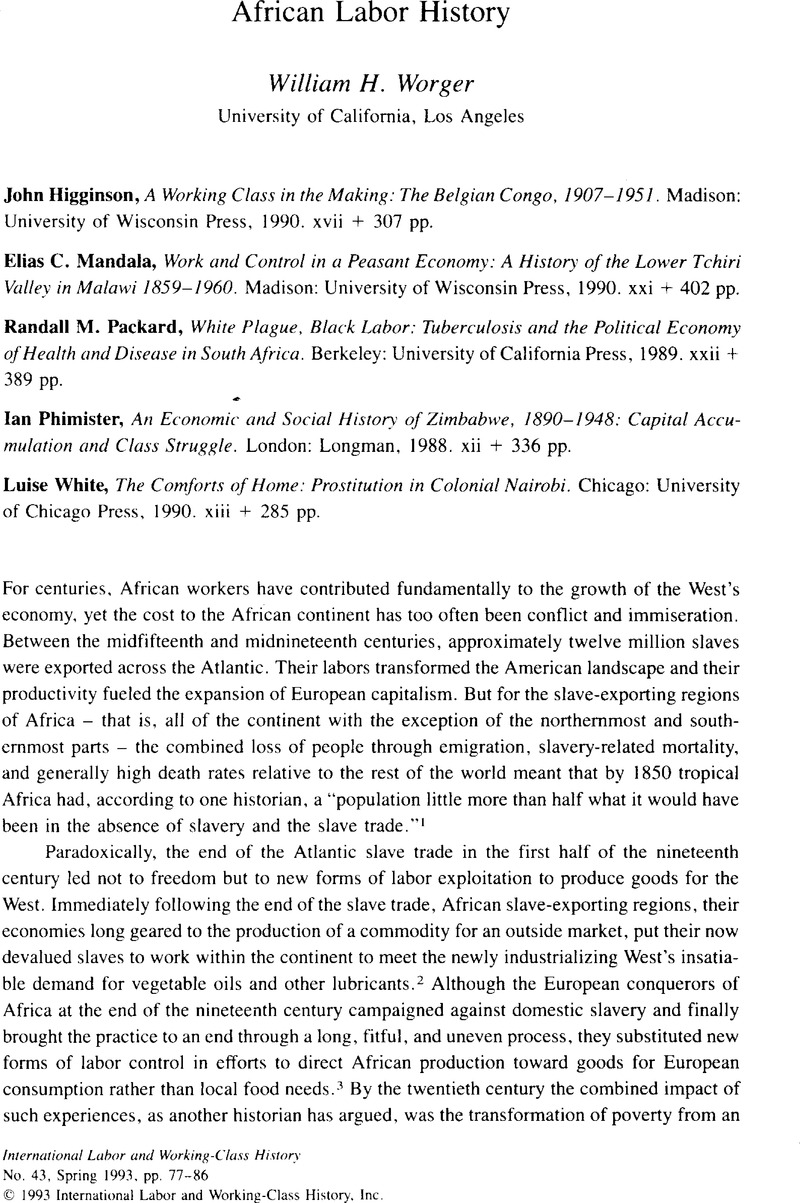No CrossRef data available.
Published online by Cambridge University Press: 16 December 2008

I wish to thank the members of my Winter 1992 seminar in African labor history at UCLA for their discussions of the books reviewed, and Nancy Clark for her insights into the impact of colonialism of Africa.
1. Manning, Patrick, Slavery and African Life: Occidental, Oriental, and African Slave Trades (New York, 1990), 171Google Scholar. Manning's point is not uncontested. For other recent studies of the Atlantic slave trade and slavery in Africa. see Miller, Joseph, Way of Death: Merchant Capitalism and the Angolan Slave Trade, 1730–1830 (Madison, 1989)Google Scholar: and Law, Robin, The Slave Coast of West Africa, 1550–1750: The Impact of the Atlantic Slave Trade on an African Society (Oxford, 1991)Google Scholar.
2. The best studies of this process are Hopkins, A. G., An Economic History of West Africa (New York, 1973)Google Scholar; and Cooper, Frederick, Plantation Slavery on the East Coast of Africa (New Haven, 1977)Google Scholar.
3. On the end of slavery. see Miers, Suzanne and Roberts, Richard, eds., The End of Slavery in Africa (Madison, 1988)Google Scholar. On transformations in production and labor, see Hopkins, , Economic History of West Africa: and Cooper, Frederick, From Slaves to Squatters (New Haven, 1981)Google Scholar.
4. Iliffe, John, The African Poor (New York, 1989)Google Scholar.
5. Key studies on West Africa are Meillassoux, Claude, Maidens, Meal, and Money (Cambridge, 1981)Google Scholar: and Roberts, Richard L., Warriors, Merchants, and Slaves: The State and the Economy in the Middle Niger Valley, 1700–1914 (Stanford, 1987)Google Scholar.
6. A particularly fine study of African agricultural innovation in the context of colonialism is Berry, Sara, Cocoa, Custom, and Socio-Economic Change in Rural Western Nigeria (Oxford, 1975)Google Scholar.
7. On the refashioning of urban spaces under colonialism, see Cooper, Frederick, ed. The Struggle for the City (Beverly Hills, 1984)Google Scholar and idem., On the African Waterfront (New Haven, 1987)Google Scholar.
8. Freund, Bill, has provided an excellent overview of the historiography of labor in Africa in his The African Worker (New York, 1988)Google Scholar.
9. Higginson notes in his bibliography that the Watch Tower archive is not open to nonmembers of the church but that the archivists were willing to provide photocopied material in response to specific research questions.